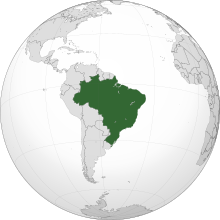Portuguese (Brazil)
| Brazilian Portuguese | |
|---|---|
| Português do Brasil português brasileiro |
|
|
Native speakers
|
204 million (2015) |
|
Indo-European
|
|
| Official status | |
|
Official language in
|
|
|
Recognised minority
language in |
|
| Language codes | |
| ISO 639-3 | – |
| Glottolog | braz1246 |
| IETF | pt-BR |

|
|
Brazilian Portuguese (português do Brasil [poʁtuˈɡez du bɾaˈziw] or português brasileiro [poʁtuˈɡez bɾaziˈlejɾu]) is a set of dialects of the Portuguese language used mostly in Brazil. It is spoken by virtually all of the 200 million inhabitants of Brazil and spoken widely across the Brazilian diaspora, today consisting of about two million Brazilians who have emigrated to other countries.
This variety of the Portuguese language differs, particularly in phonology and prosody, from varieties and dialects spoken in most Portuguese-speaking majority countries, including native Portugal and African countries – the dialects of which, partly because of the more recent end of Portuguese colonialism in these regions, tend to have a closer connection to contemporary European Portuguese. Despite this, Brazilian and European Portuguese vary little in formal writing (in many ways analogous to the differences encountered between American and British English).
...
Wikipedia
